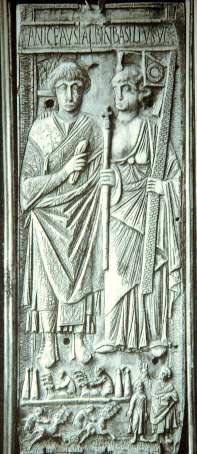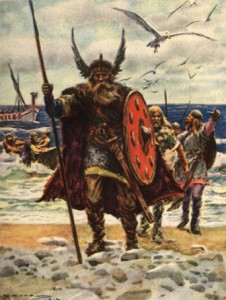 Listener Allison asked which emperor had the distinction of being the last Roman sovereign to set foot in the ancient capital city. It was the uninspiring John VIII who visited in 1423 to beg for help against the Ottoman Turks. His stay in the Eternal City was quite a contrast from the previous imperial visit. That had been in 663 when the emperor Constans II had visited for 12 days. Despite a stay of less than two weeks, Constans managed to annoy the entire population by stripping everything of value (including the bronze from the roof of the Pantheon) to fund his war against the Arabs. Rumor had it that his tax collectors were so severe that husbands were sold into slavery and wives were forced into prostitution to meet the sums demanded. Fortunately for John VIII, seven centuries tend to dim those kind of memories. He was given a warm welcome and Renaissance artists, taken by his exotic dress left several realistic portraits. Thanks to that Roman trip, he remains the one Byzantine emperor to be realistically painted- a notoriety he certainly didn’t deserve!
Listener Allison asked which emperor had the distinction of being the last Roman sovereign to set foot in the ancient capital city. It was the uninspiring John VIII who visited in 1423 to beg for help against the Ottoman Turks. His stay in the Eternal City was quite a contrast from the previous imperial visit. That had been in 663 when the emperor Constans II had visited for 12 days. Despite a stay of less than two weeks, Constans managed to annoy the entire population by stripping everything of value (including the bronze from the roof of the Pantheon) to fund his war against the Arabs. Rumor had it that his tax collectors were so severe that husbands were sold into slavery and wives were forced into prostitution to meet the sums demanded. Fortunately for John VIII, seven centuries tend to dim those kind of memories. He was given a warm welcome and Renaissance artists, taken by his exotic dress left several realistic portraits. Thanks to that Roman trip, he remains the one Byzantine emperor to be realistically painted- a notoriety he certainly didn’t deserve!
 Listener John asked when exactly the office of the Consul died out. The Consulship was the highest office in Republican Rome, dating back to the hazy days in the sixth century BC when the last Etruscan King was expelled from the city. The two elected Consuls held most of the powers of a king, and dates were calculated from the start of their terms. With the rise of the empire, however, it became a largely symbolic office, and was mostly awarded by emperors to themselves. Its prestige was further diminished when later rulers started conferring it on imperial children (Caligula didn’t help matters when he announced that he was nominating his horse) and by the time of Justinian in the sixth century it was allowed to lapse from its yearly appointment. The last politician to hold it was a man with the impressive name of Anicius Faustus Albinus Basilius in 541 (that’s a picture of him at the top). He had the misfortune to be in Rome when Totilla and the Goths stormed it, and was forced to flee with his Consular robe into obscurity. That wasn’t quite the end of the office, however. It continued to exist as part of the coronation ceremony for another century. The last recorded emperor to receive the dignity was Justinian II who combined the Consulate with the office of Emperor. From then on the title seems to have been forgotten until the tenth century when the emperor Leo the Wise officially abolished it.
Listener John asked when exactly the office of the Consul died out. The Consulship was the highest office in Republican Rome, dating back to the hazy days in the sixth century BC when the last Etruscan King was expelled from the city. The two elected Consuls held most of the powers of a king, and dates were calculated from the start of their terms. With the rise of the empire, however, it became a largely symbolic office, and was mostly awarded by emperors to themselves. Its prestige was further diminished when later rulers started conferring it on imperial children (Caligula didn’t help matters when he announced that he was nominating his horse) and by the time of Justinian in the sixth century it was allowed to lapse from its yearly appointment. The last politician to hold it was a man with the impressive name of Anicius Faustus Albinus Basilius in 541 (that’s a picture of him at the top). He had the misfortune to be in Rome when Totilla and the Goths stormed it, and was forced to flee with his Consular robe into obscurity. That wasn’t quite the end of the office, however. It continued to exist as part of the coronation ceremony for another century. The last recorded emperor to receive the dignity was Justinian II who combined the Consulate with the office of Emperor. From then on the title seems to have been forgotten until the tenth century when the emperor Leo the Wise officially abolished it.
 Listener Bruce from Ohio asked about the background of the Normans. Can they really be considered Vikings? The answer- as is so often the case with history- is yes and no. The Normans were indeed descended from Scandinavian stock and the term ‘Norman’ comes from ‘northmen’ which was the French term for the Vikings. Rollo the first “Duke” led a collection of Norwegian and Danish raiders who forced the Frankish king Charles the Simple to grant them land. These Vikings, however, were always a minority in Normandy, surrounded and vastly outnumbered by the French population. Rollo, who knew he had to adapt to survive, set the tone by taking a Frankish wife, adopting the French language and religion, and encouraging his men to do likewise. Within a generation Norse names died out, and the Dukes were busy trying to prove that they were respectable members of the Frankish power structure. They maintained close ties with their Scandinavian cousins- even agreeing to sell Viking plunder in their markets- but made it a point to distinguish themselves from the ‘sea wolves’.
Listener Bruce from Ohio asked about the background of the Normans. Can they really be considered Vikings? The answer- as is so often the case with history- is yes and no. The Normans were indeed descended from Scandinavian stock and the term ‘Norman’ comes from ‘northmen’ which was the French term for the Vikings. Rollo the first “Duke” led a collection of Norwegian and Danish raiders who forced the Frankish king Charles the Simple to grant them land. These Vikings, however, were always a minority in Normandy, surrounded and vastly outnumbered by the French population. Rollo, who knew he had to adapt to survive, set the tone by taking a Frankish wife, adopting the French language and religion, and encouraging his men to do likewise. Within a generation Norse names died out, and the Dukes were busy trying to prove that they were respectable members of the Frankish power structure. They maintained close ties with their Scandinavian cousins- even agreeing to sell Viking plunder in their markets- but made it a point to distinguish themselves from the ‘sea wolves’.
So what exactly were they? As frustrating as it is we have to fall back on how they saw themselves. Their court historians never tired of pointing it out. They were not Vikings or French but something far better. They were Normans.
 Listener Allison asked which emperor had the distinction of being the last Roman sovereign to set foot in the ancient capital city. It was the uninspiring John VIII who visited in 1423 to beg for help against the Ottoman Turks. His stay in the Eternal City was quite a contrast from the previous imperial visit. That had been in 663 when the emperor Constans II had visited for 12 days. Despite a stay of less than two weeks, Constans managed to annoy the entire population by stripping everything of value (including the bronze from the roof of the Pantheon) to fund his war against the Arabs. Rumor had it that his tax collectors were so severe that husbands were sold into slavery and wives were forced into prostitution to meet the sums demanded. Fortunately for John VIII, seven centuries tend to dim those kind of memories. He was given a warm welcome and Renaissance artists, taken by his exotic dress left several realistic portraits. Thanks to that Roman trip, he remains the one Byzantine emperor to be realistically painted- a notoriety he certainly didn’t deserve!
Listener Allison asked which emperor had the distinction of being the last Roman sovereign to set foot in the ancient capital city. It was the uninspiring John VIII who visited in 1423 to beg for help against the Ottoman Turks. His stay in the Eternal City was quite a contrast from the previous imperial visit. That had been in 663 when the emperor Constans II had visited for 12 days. Despite a stay of less than two weeks, Constans managed to annoy the entire population by stripping everything of value (including the bronze from the roof of the Pantheon) to fund his war against the Arabs. Rumor had it that his tax collectors were so severe that husbands were sold into slavery and wives were forced into prostitution to meet the sums demanded. Fortunately for John VIII, seven centuries tend to dim those kind of memories. He was given a warm welcome and Renaissance artists, taken by his exotic dress left several realistic portraits. Thanks to that Roman trip, he remains the one Byzantine emperor to be realistically painted- a notoriety he certainly didn’t deserve!
